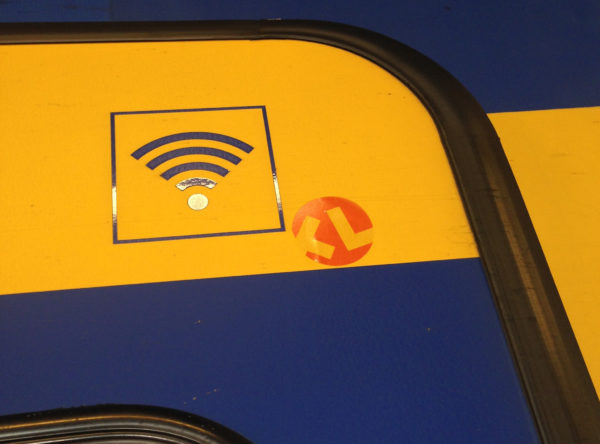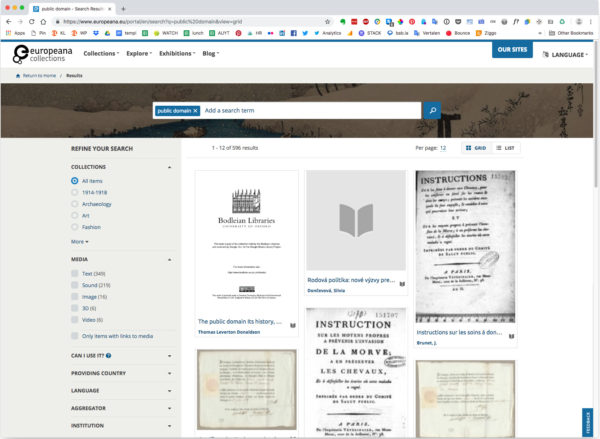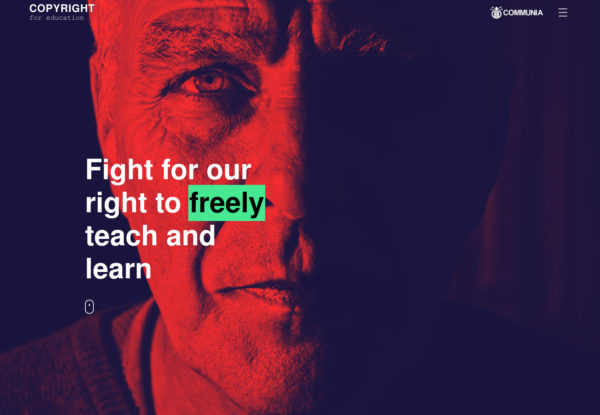Time to move on: what we have done to improve copyright and access to cultural heritage
At the end of 2018 we will end our activities in the areas of copyright and cultural heritage. Kennisland has been working on these themes for over a decade. Read in this article what we have done for open access, open content and the modernisation of copyright.
- Betrokken KL'ers
- Paul Keller
- Lisette Kalshoven

7 A.M. (New Year’s Morning) by László Moholy-Nagy. This artwork is featured on Art Up Your Tab.
Maker: László Moholy-Nagy
DownloadAt the end of this year we will end our activities in the areas of copyright and cultural heritage.++Why we stopBoth the funding model and the relationship with our network of partners drove us to the conclusion that KL is no longer the place for this type of long-term strategic policy work with an international focus. Read more on Paul Keller’s blog. Kennisland has been working on these themes for over a decade but with the departure of Paul Keller, who has been leading these efforts, we have decided to focus our energies on innovation in Education, Cities and Care.
Internet access, civil society media and open content
Over the past fifteen years our efforts to create an open, knowledge driven society have taken a lot of different forms.Over the past fifteen years our efforts to create an open, knowledge driven society have taken a lot of different forms. Driven by the conviction of our founders that the technological revolution started by increasing access to the internet presented a lot of benefits to an open, inclusive and diverse society, we have worked on a wide range of projects that tried to leverage new technologies for social progress. This ranged from initiatives to improve internet access in disadvantaged communities like Digitale trapvelden (‘Digital playing fields’) to ideas ahead of their time like WIFI in de trein (‘WIFI in the train’).++WIFI in trainsOur 2005 project proposed to install WIFI networks in all trains. It took more than ten years before a majority of the Dutch trains were equipped with WIFI. These days most of them (with the notable exception of the “Intercity direct” service between Amsterdam and Rotterdam) broadcast our old project name as the SSID of their free WIFI networks.

The main catalyst in this area turned out to be the Digital Pioneers programme we ran from 2002 to 2010. Through this programme, designed to support small civil society organisations in setting up technology driven activities, we learned a lot about the potential and the challenges posed by the rapid digitisation of society. One of these challenges that we identified early on was how copyright and other forms of intellectual property were not evolving at the same speed as technology. This meant that technology enabled many activities that were in conflict with copyright and other laws.Technology enabled many activities that were in conflict with copyright and other laws. Therefore, in 2003, we started the project DISC (Domain Innovative Software and Content). Together with Waag Society we helped civil society organisations to leverage the power of open source software and open content. Our involvement in the emerging field of open content led us to set up Creative Commons Nederland, which Kennisland ran (together with the Institute for Information Law) from 2005 until 2018.++Creative Commons chapterIn 2018 Creative Commons Netherlands was relaunched as a chapter of the Creative Commons Global Network. The Dutch chapter is chaired by Maarten Zeinstra (who previously worked at Kennisland) and our own Lisette Kalshoven serves as the global network representative.
Working on the development and promoting the use of the Creative Commons licenses was our first step into the area of copyright, and brought us in contact with the copyright establishment. In the fall of 2007, after years of discussion and relationship building, we launched a pilot project with Buma/Stemra that for the first time allowed members of a collective management organisation (music authors) to share some of their works under an open license. This breakthrough later provided the basis for a flexible model that gives Buma/Stemra members more say over how their rights are managed.
Opening up cultural heritage
Also in 2007, Kennisland, together with the Dutch Institute for Sound and Vision, the EYE Filmmuseum and the National Archives embarked on an ambitious project to digitise the audio visual memory of the Netherlands. At the time, the projectIn 2007, Kennisland embarked on the largest digitisation project in Europe: Images for the Future. Our priority was to make sure that the digitised works would become available online under conditions that would allow reuse. called Images for the Future was the largest digitisation project in Europe. Kennisland was responsible for the copyright, communication and business model aspects of the project. During the project (2007-2014) the project partners restored, preserved and digitised over 90,000 hours of video, 20,000 hours of film, 100,000 hours of audio and 2,500,000 photos.
As one of the initiators of Images for the Future our priority was to make sure that the digitised works would become available online under conditions that would allow reuse. With regards to this objective the project turned out to be less successful. Regretfully only a small percentage of the overall collections could be made available online, mainly because of unresolved copyright issues. Copyright turned out to be a much more thorny issue than we had expected. The original project plan was based on the assumption that copyright owners would provide permission for the digitised material to be used in return for payment. In reality, most of them did not, as the economic incentive never materialised.++7 years of Images for the FutureYou can find a more in-depth analysis of the results of the project in our publication ‘Images of the Past – 7 years of Images for the Future’.
However, we did manage to demonstrate the impact of making cultural heritage collections available under open licensesWe managed to demonstrate the impact of making cultural heritage collections available under open licenses. through platforms such as Open Images++Open ImagesOpen Images became an important source of historical video content for Wikipedia, with large audiences. For example, in October 2018: 5,6 million pageviews. and the collaboration between the National Archives and Wikimedia. The latter illustrated that by sharing content on open platforms, institutions could reach new and larger audiences. These experiments around opening up collections for reuse became very influential for the nascent OpenGLAM movement. Realising that opening up GLAM collections (Galleries, Libraries, Archives, and Museums) was primarily a matter of working with public domain works and metadata, we worked with Creative Commons on developing the tools to facilitate this.+
+Open content toolsIn 2010 Creative Commons launched the CC0 public domain waiver which later became the de facto standard for sharing cultural heritage metadata. In 2010 Creative Commons launched the Public Domain Mark intended to label works that are in the Public Domain.
From 2009 onwards we also worked with collective rights management organisations on a number of pilot projects that explored the possibility of extended collective licensing as a mechanism to get more digitised cultural heritage available online. These projects proved to be successful and in response in 2013 cultural heritage institutions and collective rights management organisations joined forces (article available in Dutch only) to ask the Dutch legislator to provide a legal basis for extended collective licensing.++Extended Collective LicensingIn 2015 the government responded by announcing that they intended to introduce Extended Collective Licensing into the Dutch copyright act. In the light of the 2016 EU copyright reform proposals this process is currently stalled.

Based on our work in the cultural heritage sector we were an early partner of Europeana, the EU funded platform that brings together digitised cultural heritage from thousands of libraries, archives and museums across the EU.We are proud to have been a driver of Europeana becoming one of the leading voices advocating for open access to cultural heritage and the protection of the Public Domain. Europeana is the EU funded platform that brings together digitised cultural heritage from thousands of libraries, archives and museums across the EU. Europeana provided us with an opportunity to apply the lessons that we had learned in the Images for the Future project on a wider scale. Together with the Institute for Information Law and the Bibliothèque Nationale de Luxembourg we developed a licensing framework that ensures full reusability of the metadata aggregated by Europeana. It encourages institutions to make their collections available for reuse under open licenses.++Art Up Your TabTo set an example, we developed Art Up Your Tab (together with Studio Parkers and Sara Kolster), a browser extension (plug-in) that shows users inspiring hi-res images from the rich collection of Europeana and the MET with every new tab or browser window that they open. The extension generates over 6 million views per year. Today, ten years later, Europeana is the biggest aggregator of openly licensed cultural heritage resources, hosting more than twenty million freely licensed works.++EuropeanaSince earlier this year our former colleague Harry Verwayen serves as Director of Europeana. The success of the Europeana Licensing Framework, which focuses on clear rights information for end users promotes reuse, has inspired other cultural heritage aggregators around the globe++Rights statementsIn 2016 together with Europeana and the DPLA we launched rightsstatements.org to better allow cultural heritage institutions around the globe to clearly communicate the copyright and reuse information of objects in their collections., such as the Digital Public Library of America. Over the years of our collaboration Europeana has developed into one of the leading voices advocating for open access to cultural heritage and for the protection of the Public Domain.++Protection of public domainAs expressed in the 2009 Public Domain charter which Kennisland drafted for Europeana. We are proud to have been a driver of this.
Fighting for better copyright rules in Europe
Since 2016 we have also worked with Europeana on making sure that the ongoing EU copyright reform will improve the ability of cultural heritage institutions to make more of their collections available online. While the reform process is not concluded, there are indications that the EU copyright reform package will finally provide a workable answer for the copyright problems faced by libraries, museums and archivesTogether with our partners we have been advocating for Europe-wide rules that benefit educators and scientists, and encourage innovation and broad access to knowledge and culture. It is clear that copyright will continue to serve as a major barrier to unlocking the full potential of digital technologies for public institutions and civil society at large. engaged in large scale digitisation efforts.

But our fight for better copyright rules++#FIXCOPYRIGHTOver the years we published numerous opinion articles on the subject of copyright reform. Read more about our efforts to modernise copyright law in the EU. extends further than improving the position of cultural heritage institutions. As a founding member and core contributor of the International COMMUNIA Association we have been advocating for a more user-friendly and modern EU copyright framework. Together with our partners we have been advocating for Europe-wide rules++Fragmentation of rulesSee copyrightexceptions.eu for research on the fragmented nature of user rights in the EU copyright framework that we have undertaken in 2016. that benefit educators++Copyright 4 EducationThe education community (teachers, educators, lawyers, researchers, librarians, activists, experts on copyright) joins forces to ask for a better copyright for education. Check out the campaign website copyrightforeducation.eu. and scientists, and encourage innovation and broad access to knowledge and culture. The fight for a more sensible copyright system remains an uphill battle. The legislative fight over the Digital Single Market Copyright Directive++DSM Copyright DirectiveA controversial proposed European Union directive intended to ensure “a well-functioning marketplace for the exploitation of works and other subject-matter … taking into account in particular digital and cross-border uses of protected content.” Read more is still ongoing, and while it looks like we (together with our partners) have achieved substantial improvements for the cultural heritage and the educational sectors, it is also clear that copyright will continue to serve as a major barrier to unlocking the full potential of digital technologies for public institutions and civil society at large.
What’s next?
With the EU copyright reform process almost completed++It does not stop hereIn 2019, our work on the EU copyright directive will be continued by our partners at Europeana and COMMUNIA. You can read a more in depth reflection on the challenges ahead for digital policy making on Paul Keller’s personal blog. , it is time to shift our attention to other important societal challenges. Kennisland will continue to work on issues related to digitisation and technological innovation, but we will do so in the context of our main focus areas Education, Cities and Care. We cherish our successes and lessons and continue to work towards a world that is inclusive and sustainable in all respects.+
+What we do and why we do itLearn how Kennisland researches and designs social progress.One of hardest things to do as innovator: letting go your success & move on to the next challenge to solve. Extremely proud of team @Kennisland taking this bold step. #systemschange #psilabs https://t.co/rQzVO9iqMY
One of hardest things to do as innovator: letting go your success & move on to the next challenge to solve. Extremely proud of team @Kennisland taking this bold step. #systemschange #psilabs https://t.co/rQzVO9iqMY
— Joeri vd Steenhoven (@Joerivds) 20 december 2018
A deep bow for @paul_keller and everyone at @Kennisland for all your hard work re open cultural data in the past decade. Your help was crucial for @rijksmuseum to open its collections the way it did (and does!) 🙏 🙏 🙏
— Saskia Scheltjens (@saschel) 1 januari 2019
A big THANK YOU to you all at Kennisland for your important work in these fields!
— KVAN/BRAIN (@archiefbrain) 21 december 2018
- Betrokken KL'ers
- Paul Keller pk@kl.nl
- Lisette Kalshoven lk@kl.nl

